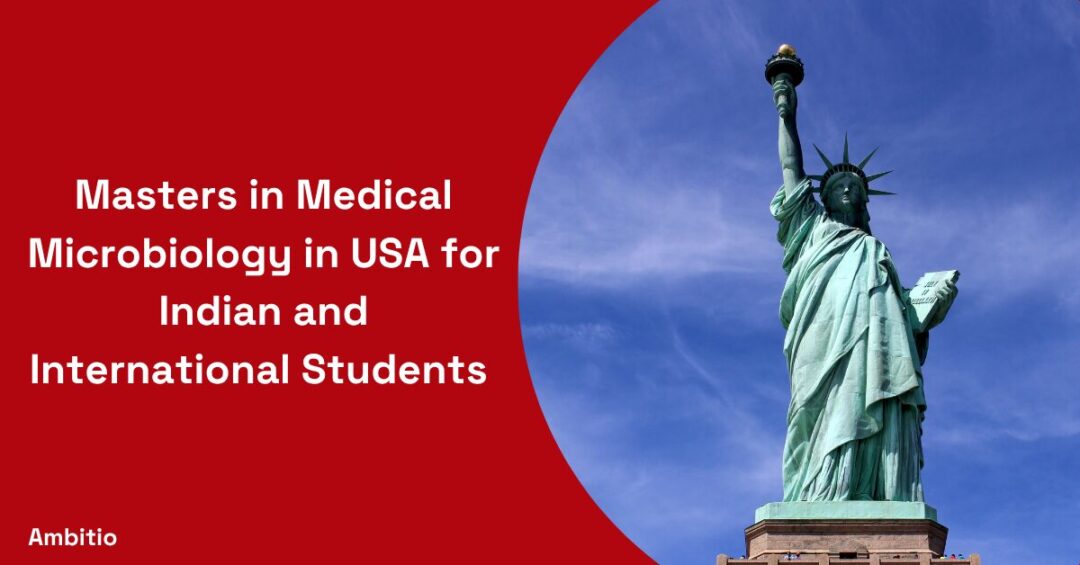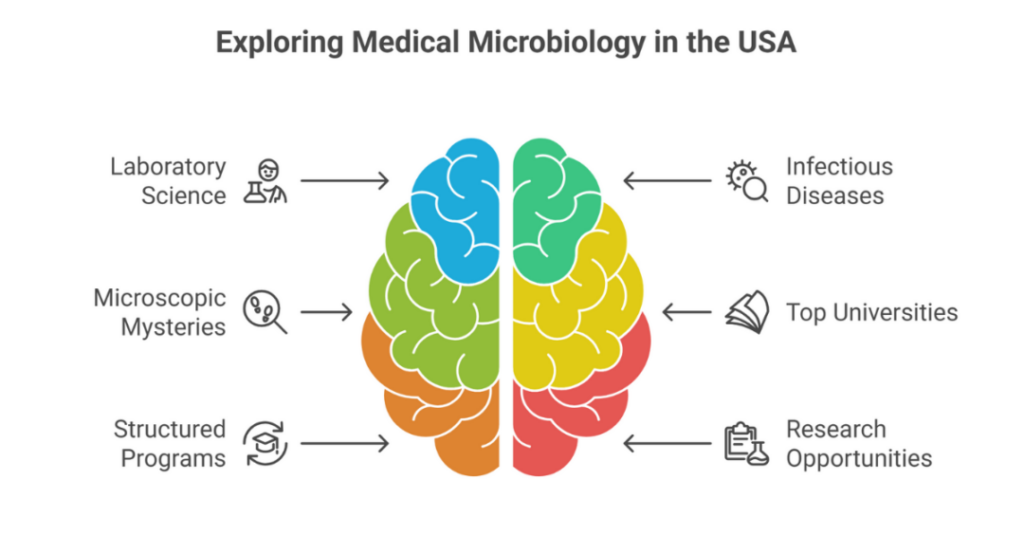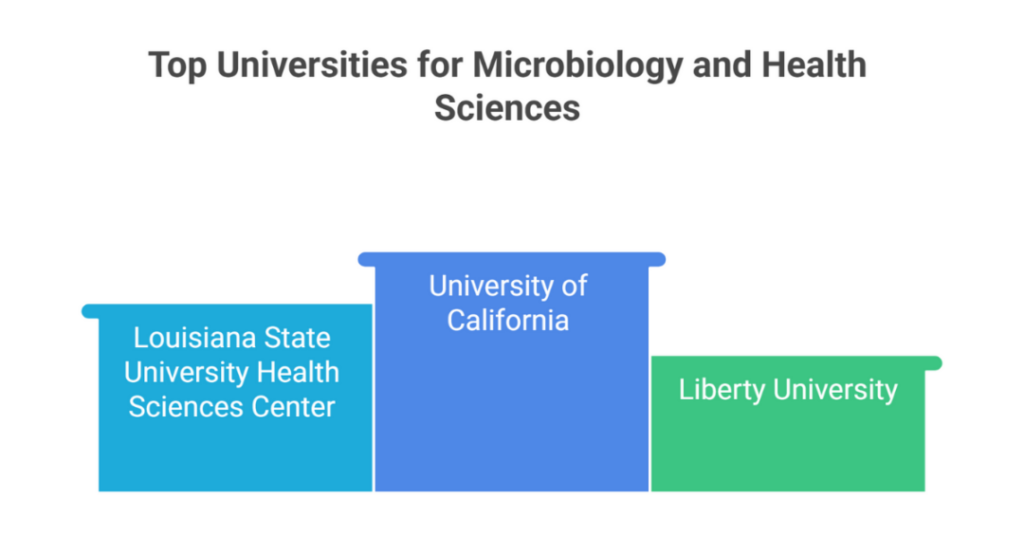28 July 2025
5 minutes read
Masters in Medical Microbiology in USA for Indian and International Students: 5 Best Universities in USA Offering Microbiology Courses

Key Takeaways
- Masters in Medical Microbiology in USA offers world-class education with a focus on research, laboratory training, and global career opportunities.
- Masters in Medical Microbiology in USA equips students with clinical, molecular, and public health skills through top-ranked science programmes.
- Masters in Medical Microbiology in USA provides scholarships, high employability, and access to advanced biomedical and microbial research labs.
Masters study Medical microbiology is a captivating blend of laboratory science, infectious diseases, and microscopic mysteries.
For Indian and international students, the USA opens doors to top universities offering structured and research-rich microbiology programs. Here’s your expert guide to everything you need to know.
What is the Minimum Score and Average Score Requirements if You Want to Study Abroad?
Did you know some U.S. institutions consider applicants with a GPA as low as 3.0? Competitive programs often demand higher.
- Minimum GPA: 3.0-GPA (out of 4.0)
- IELTS/TOEFL: IELTS 6.5+, TOEFL 80+
- GRE: Recommended for top-ranking universities

| Test | Minimum Score | Average Accepted Score |
|---|---|---|
| GPA | 3.0 | 3.5 |
| IELTS | 6.5 | 7.0 |
| TOEFL | 80 | 90–100 |
| GRE | Optional | 300+ |
How to Become a Microbiologist in the USA?
Microbiologists work with living organisms like fungi and viruses. Fun fact: The average microbiologist uses over 50 different tools weekly, including a microscope!
- Complete a bachelor’s degree in biology, chemistry, or biomedical sciences
- Enroll in a master’s or postgraduate microbiology course
- Gain laboratory experience and submit a research-based thesis
| Step | Requirement | Details |
| Undergraduate | Biology/Chemistry Degree | 3–4 years |
| Master’s Program | Medical Microbiology Course | 2 years with lab coursework |
| Licensing/Certification | Optional, State-Specific | Clinical Lab Tech License |
Why Study Clinical and Molecular Microbiology Programs in USA?
Did you know that each year, more than 5000 students worldwide take up U.S. clinical and molecular-microbiology degrees.
- Access to advanced laboratory facilities
- Diverse health sciences programs emphasizing bacteria and microbial-diseases.
- Good career paths available in the biomedical sciences and public-health.
| Feature | USA Programs | Benefits |
| Laboratory Access | High-end Equipment | Hands-on Learning |
| Course Specialization | Clinical, Immunology | Tailored Skillsets |
| Employment Rate | 90%+ Post-Graduation | Strong ROI |
Why Pursue Masters in Medical Microbiology in the USA as an International Student?
Here’s a quirky stat: Around 60% of international students in microbiology-programs in USA are from Asia.
- Exposure to interdisciplinary academic environments
- Curriculum designed with real-world applicability
- Scholarships and fee waivers for international students
| Criteria | Benefit | USA Highlights |
| Cultural Diversity | Global Academic Network | 1M+ International Students |
| Funding Opportunities | Financial Aid & Assistantships | Vary by University |
| Work Opportunities | OPT/STEM Extensions | Upto 36 Months |
Top 5 Universities for Microbiology Courses and Biology, Immunology and Health-Science Programmes
Fun fact: The University of California houses one of the world’s top microbial-libraries!
1. University of California
Offers a top-ranked master’s degree program in biomedical-sciences with access to advanced molecular-biology labs. Requires GRE, TOEFL/IELTS, and SOP.
2. Louisiana State University Health-Sciences Center
This state university offers specialized programmes in infectious diseases, immunology, and medical microbiology. Requires a bachelor’s degree, resume, transcripts, and personal statement.
3. Liberty University
Liberty provides flexible online and in-person microbiology degrees. Applicants must submit a minimum 3.0-GPA, IELTS/TOEFL scores, and ACT/SAT optional.
4. University of Wisconsin-Madison
Many highly rated health-sciences programs. The University of Wisconsin-Madison has microbiology, cell biology, and genetics specializations and offers thesis-based master’s programs.
5. Johns Hopkins University
Famous for clinical microbiology research and good health-sciences programs. Requires GMAT/GRE plus a personal statement, letters of recommendation, and resume.
Curriculum and Courses Offered at Leading Universities
Did you know that an average microbiology program can contain up to 200 hours of lab-based coursework?
- Cell-biology and microbial-physiology
- Pathogenic bacteriology and virology
- Advanced molecular-techniques and bioinformatics

| University | Core Courses Offered | Lab Hours |
| UC | Genetics, Virology, Molecular-Biology | 200+ |
| LSU Health | Immunology, Biochemistry, Public-Health | 180+ |
| Liberty University | Clinical Microbiology, Microscopy | 150+ |
What are the Admission Requirements and Entry Requirements for Microbiology in USA?
From transcripts to test scores, US universities evaluate every detail. Fun fact: Some institutions assess over 5000 international applications annually!
- Bachelor’s in a science or biological field
- IELTS/TOEFL and GRE/SAT/GMAT (may differ)
- Transcript, personal statement, SOP, resume, and recommendation letters
| Requirement | Minimum Eligibility | Notes |
| GPA | 3.0-GPA | On a 4.0 scale |
| English Language Tests | IELTS 6.5 / TOEFL 80 | Test scores required |
| Documents | SOP, LOR, Resume, Transcript | Varies by institution |
Louisiana State University Health Sciences Center vs University of California vs Liberty University
All three institutions offer world-class courses. Fun fact: UC and LSU have active partnerships with public-health labs worldwide.
- UC: High-ranking with a focus on research and innovation
- LSU Health: Specializes in infectious diseases and population health
- Liberty: Offers flexibility with online options and lower tuition fees
| University | Focus Area | Tuition Fee (INR) | Ranking 2024 |
| UC | Biomedical-Research | 30–35 Lakhs | Top 50 |
| LSU Health | Clinical Microbiology | 20–25 Lakhs | Top 150 |
| Liberty | Online/Clinical Labs | 15–20 Lakhs | Top 200 |
Tuition Fees and Scholarship Eligibility for Microbiology, Biochemistry, Cell Biology and Genetics Courses
Fun fact: Over $200 million is awarded annually in scholarships to students pursuing health-sciences programs in the US
- Tuition varies from INR 15L to 35L per year
- Scholarships based on merit, need or departmental nomination
- Assistantships available for research students
| University | Tuition Fee (INR) | Scholarship Type | Eligibility |
| UC | 30–35 Lakhs | Research Assistantship | GPA 3.5+, SOP, LOR |
| LSU Health | 20–25 Lakhs | Merit-Based Scholarships | Academic + Extracurricular |
| Liberty | 15–20 Lakhs | Need-Based Aid | FAFSA Equivalent Required |
Cellular vs Microbial vs Molecular Biology: What is the Difference?
Here’s a fun comparison: You’ll find a microbiologist working with invisible living things like a virus and other microorganisms, a cellular biologist studying alga, and a molecular biologist mapping genes.
- Microbial: Focuses on fungi and bacteria
- Cellular: Studies living organisms at cell level
- Molecular: Deals with DNA, RNA, and protein interactions
| Field | Focus Area | Laboratory Skills |
| Microbial Biology | Microbe & Pathogens | Microscopy, Culturing |
| Cellular Biology | Cells & Physiology | Staining, Cell Imaging |
| Molecular-Biology | Genes & Molecules | PCR, Gel Electrophoresis |
Highlighting Your Skills and Career Prospects After Medical Microbiology
Microbiology isn’t just lab coats and petri dishes! Graduates have global opportunities across healthcare, public health, and biomedical-research.
- Careers in diagnostics, vaccine development, and public health labs
- Roles like biomedical-scientist, microbiologist, or academic researcher
- Average salary ranges from $60,000 to $90,000 annually
| Role | Average Salary (USD) | Employers |
| Microbiologist | $75,000 | CDC, WHO, Hospitals |
| Biomedical Scientist | $70,000 | Biotech Firms, Pharma Labs |
| Public Health Expert | $65,000 | Govt & NGOs |
How to Write Your Thesis for Medical Microbiology?
Your thesis is your scientific signature. In fact, many microbiology masters theses are evaluated by review panels with more than 5 subject-matter experts!
- Choose a discipline like infectious disease or pathogenic-bacteria
- Include theoretical frameworks and experimental procedures
- Ensure you finish on time and defend with confidence!
| Component | Description | Importance |
| Topic Selection | Aligns with your microbiology course | Guides Research Direction |
| Methodology | Describes Lab & Data Collection | Proves Scientific Rigor |
| Discussion | Interpretation of Results | Shows Analytical Depth |
How to Always Aim for the Highest Ranking Universities?
Many top universities reject more than 80% of students who apply to them. Plan accordingly to give yourself an advantage.
- Begin early and get your test prep and academic plan started
- Personalize your SOP and resume for each university
- Apply to a variety of universities and colleges in the USA
| Step | Action Item | Tips |
| Research | List Top Universities | Check QS 2024 Rankings |
| Test-Scores | IELTS/GRE/SAT/ACT | Aim for above-average scores |
| Documentation | Prepare SOP, LOR, Transcript | Customize Each Submission |
Conclusion
Pursuing a master’s in medical microbiology in the USA opens up a world of academic and career experience in the health universe.
From laboratory research to policy making, in the USA, you’ll not only receive a first-rate education, but there are also many of the worlds best institutions and universities that all offer specialized microbiology-programs.
To begin your educational journey abroad and apply for your student visa, reach out to Ambitio-India’s most trusted international educational partner.
FAQs
What is the eligibility for pursuing a masters in medical microbiology in USA?
To pursue a masters in medical microbiology in USA, you need a bachelor’s degree in a science-related field, a minimum GPA of 3.0, and valid test scores like IELTS, TOEFL, or GRE, depending on the university.
Which exams are required for admission to a masters in medical microbiology in USA?
Most universities offering a masters in medical microbiology in USA require IELTS or TOEFL for English proficiency and may ask for GRE scores for competitive programs.
What is the average tuition fee for a masters in medical microbiology in USA?
The average tuition fee for a masters in medical microbiology in USA ranges from INR 15 to 35 lakhs annually, depending on the university and program ranking.
Can international students get scholarships for a masters in medical microbiology in USA?
Yes, international students applying for a masters in medical microbiology in USA can apply for need-based, merit-based, and assistantship scholarships provided by universities and departments.
What are the career options after completing a masters in medical microbiology in USA?
After completing a masters in medical microbiology in USA, students can work as microbiologists, biomedical scientists, lab technicians, or research associates in public health and biotech sectors.
Is GRE mandatory for applying to a masters in medical microbiology in USA?
The GRE is not always mandatory for a masters in medical microbiology in USA; some universities waive it off, but top-ranked institutions may still require it.
How long does it take to complete a masters in medical microbiology in USA?
A masters in medical microbiology in USA typically takes 2 years to complete, including coursework, laboratory training, and thesis submission.
Ask ChatGPT

You can study at top universities worldwide!
Get expert tips and tricks to get into top universities with a free expert session.
Book Your Free 30-Minute Session Now! Book a call now




























